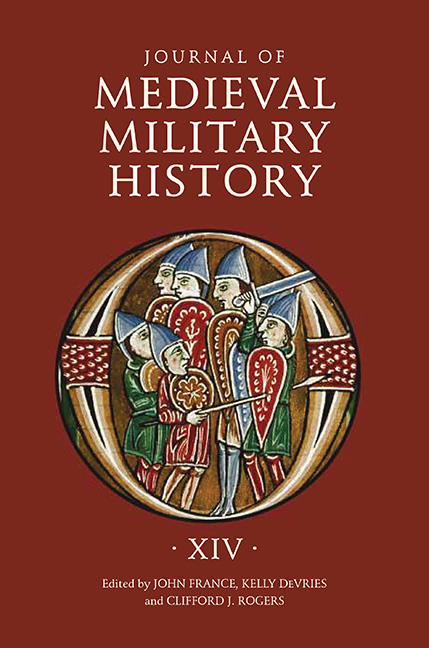Book contents
- Frontmatter
- Contents
- 1 Anglo-Norman Artillery in Narrative Histories, from the Reign of William I to the Minority of Henry III
- 2 Imperial Policy and Military Practice in the Plantagenet Dominions, c. 1337–c. 1453
- 3 The Parliament of the Crown of Aragon as Military Financier in the War of the Two Pedros
- 4 Chasing the Chimera in Spain: Edmund of Langley in Iberia, 1381/82
- 5 Note: A Medieval City under Threat Turns Its Coat, while Hedging Its Bets – Burgos Faces an Invasion in Spring 1366: Introduction and Translation
- 6 Medieval European Mercenaries in North Africa: The Value of Difference
- 7 Medieval Irregular Warfare, c. 1000–1300
- 8 Muslim Responses to Western Intervention: A Comparative Study of the Crusades and Post-2003 Iraq
- 9 “New Wars” and Medieval Warfare: Some Terminological Considerations
- 10 Friend or Foe? The Catalan Company as Proxy Actors in the Aegean and Asia Minor Vacuum
- List of Contributors
- Journal of Medieval Military History
- De Re Militari and the Journal of Medieval Military History
2 - Imperial Policy and Military Practice in the Plantagenet Dominions, c. 1337–c. 1453
Published online by Cambridge University Press: 12 September 2017
- Frontmatter
- Contents
- 1 Anglo-Norman Artillery in Narrative Histories, from the Reign of William I to the Minority of Henry III
- 2 Imperial Policy and Military Practice in the Plantagenet Dominions, c. 1337–c. 1453
- 3 The Parliament of the Crown of Aragon as Military Financier in the War of the Two Pedros
- 4 Chasing the Chimera in Spain: Edmund of Langley in Iberia, 1381/82
- 5 Note: A Medieval City under Threat Turns Its Coat, while Hedging Its Bets – Burgos Faces an Invasion in Spring 1366: Introduction and Translation
- 6 Medieval European Mercenaries in North Africa: The Value of Difference
- 7 Medieval Irregular Warfare, c. 1000–1300
- 8 Muslim Responses to Western Intervention: A Comparative Study of the Crusades and Post-2003 Iraq
- 9 “New Wars” and Medieval Warfare: Some Terminological Considerations
- 10 Friend or Foe? The Catalan Company as Proxy Actors in the Aegean and Asia Minor Vacuum
- List of Contributors
- Journal of Medieval Military History
- De Re Militari and the Journal of Medieval Military History
Summary
At the outbreak of the Hundred Years War in 1337 the Plantagenet dominions, in addition to England, comprised Gascony, Wales, parts of Ireland, the Isle of Man, the Channel Islands, and, theoretically, Scotland. The war would add to these lordships. Calais and its March were conquered in 1347; in 1360 the Treaty of Brétigny appended extensive lands to the duchy of Gascony, creating the short-lived principality of Aquitaine; Normandy was captured between 1417 and 1419; and the 1420 Treaty of Troyes established control over Paris and much of northern France.
This paper explores distinctions and common features in certain matters of policy and military practice that were applied throughout these dominions during the period of the Hundred Years War. In so doing it draws on a small area in the remarkably rich field of medieval military scholarship which has flourished so abundantly over the last twenty years or so. The quality and scale of this remarkable growth is in no small part due to the work of members of De re militari. For so long, military history was to be found in a niche area of scholarship, and rather a narrow niche at that, but the importance of medieval warfare and the medieval soldier, both in specific terms and in the ways in which it and they impacted upon political, diplomatic, and cultural affairs more widely, is now largely accepted.
This subject is, however, one shaped by historiographical divisions as well as developments, because it is, with certain notable exceptions, only relatively recently that scholars of the later Middle Ages have begun to think in holistic terms of the relationship between England and her dominions in France, Britain, and Ireland. Instead, work involving the various and, in some ways, disparate Plantagenet lordships has tended to comprise two – often distinct – areas of inquiry. These may be categorised, somewhat simplistically, as, first, insular studies, sometimes called the “New British History,” a term used to describe the collective analysis of Britain, Ireland, and the surrounding smaller islands – what J. A. Pocock called the Atlantic archipelago (and which he conceived as a subcontinental island group).
- Type
- Chapter
- Information
- Journal of Medieval Military HistoryVolume XIV, pp. 33 - 56Publisher: Boydell & BrewerPrint publication year: 2016



